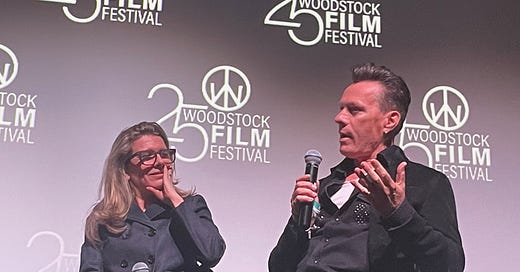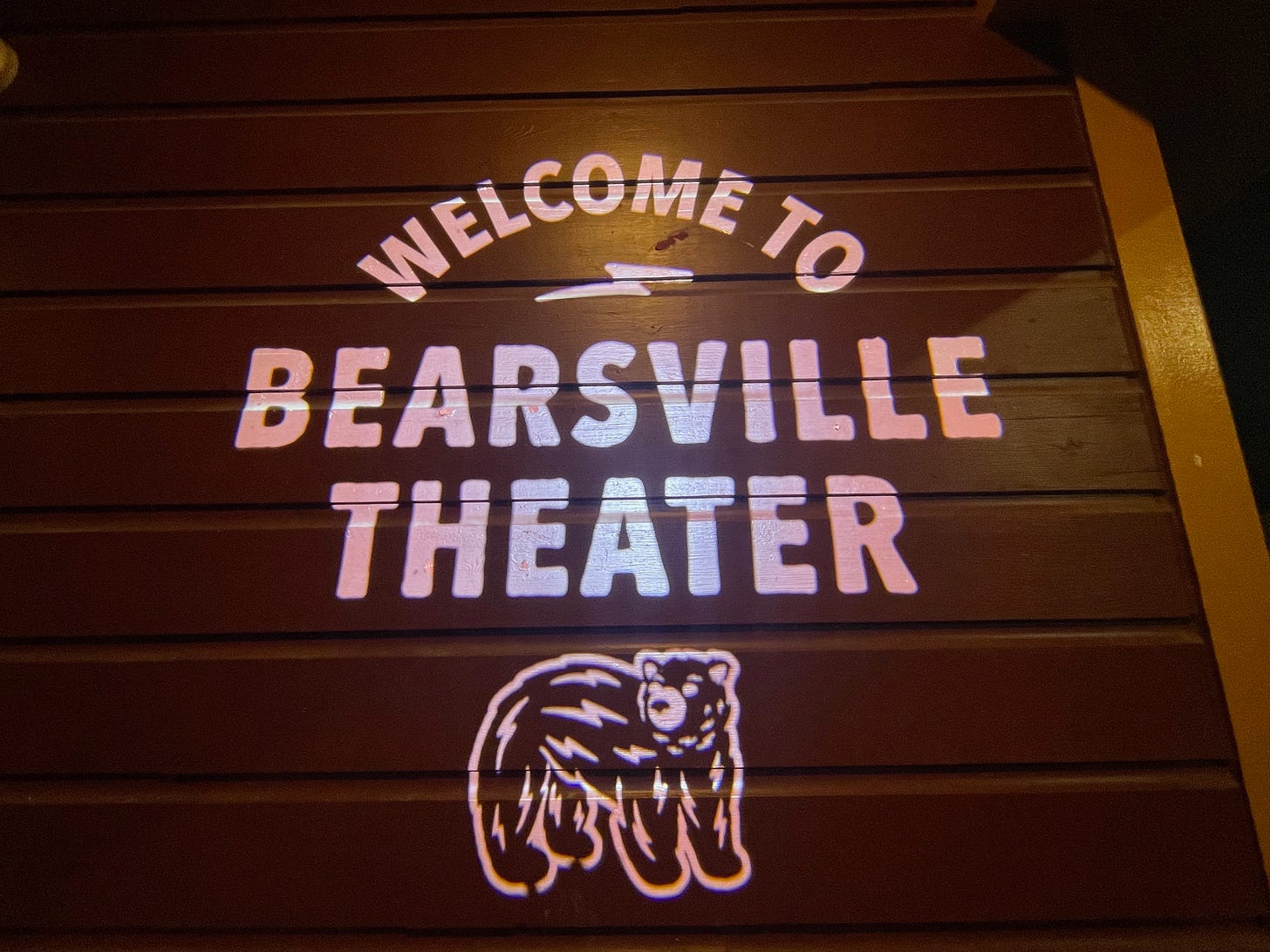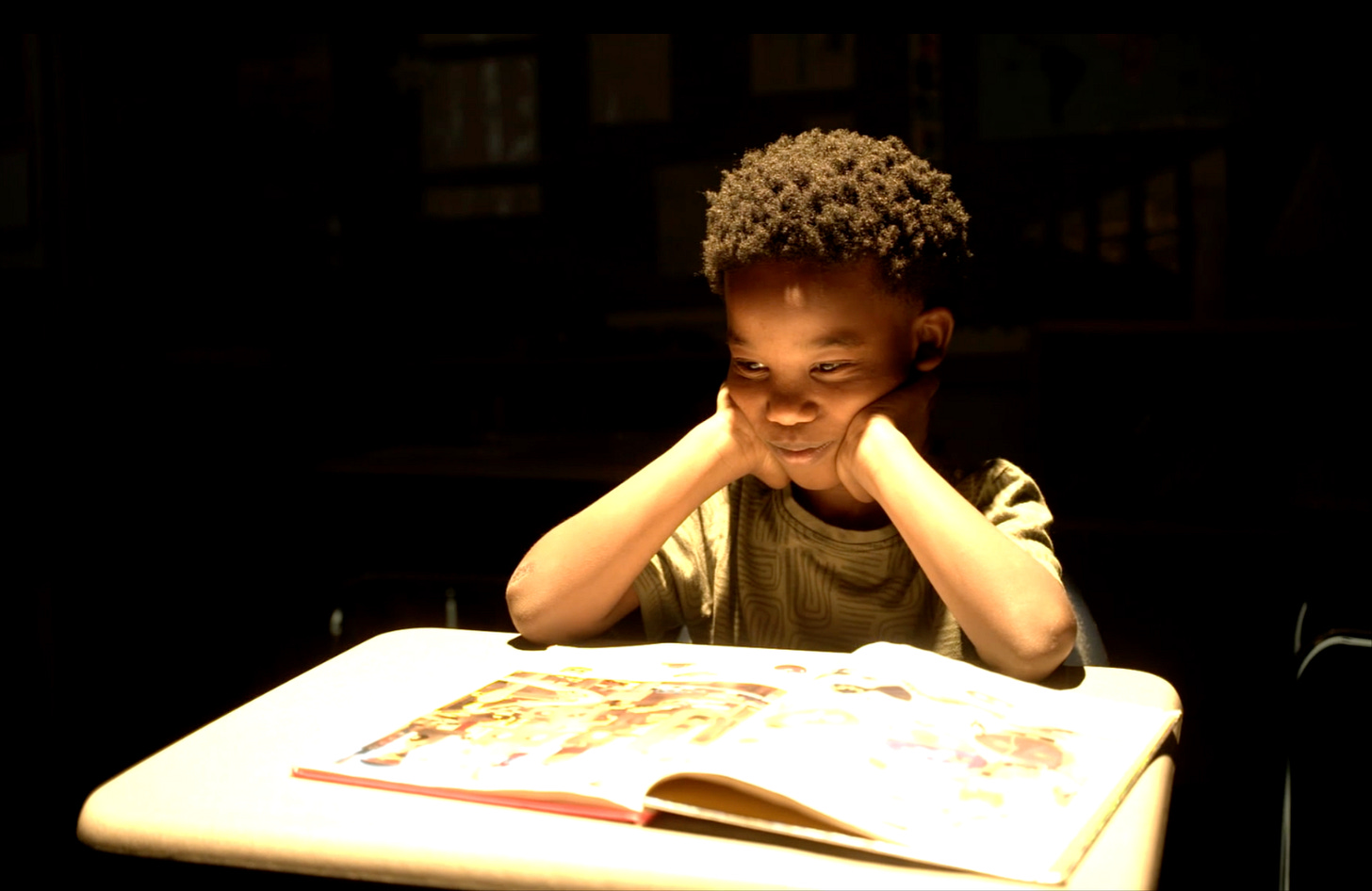Woodstock Film Festival: Larry Mullen Jr. of U2 makes surprise appearance to talk dyslexia and new doc, 'Left Behind'
Mullen following the screening of "Left Behind" joined in a panel discussion about the new documentary, which is both haunting and compelling and carries an urgent warning.
Sian Edwards-Beal and U2 drummer Larry Mullen Jr., producers of the documentary, “Left Behind,” discuss the film and dyslexia following an Oct. 18, 2024 screening at the Woodstock Film Festival. Photo by John W. Barry
U2 drummer Larry Mullen Jr. made a surprise appearance Friday evening at the Woodstock Film Festival, in New York’s Hudson Valley, at the world premiere screening of a haunting documentary with an urgent warning about dyslexia.
Mullen is a producer on “Left Behind” and with local Ulster County residents David Baron and Donna Lewis composed music for the film. Mullen and Baron wrote the opening song with Lewis; and the pair wrote the end title song with GAYLE. Mullen after the screening took part in a Q&A.
“Left Behind” chronicles the efforts of a group of New York City mothers struggling to help their dyslexic children. The courageous mothers get mired in bureaucracy, red tape and stigmas, and are forced to contend with a ghost of a target. As the film documented, New York City had no schools where children with dyslexia could receive the tailored education, attention and compassion they deserved.
Mullen, whose son is dyslexic, watched the screening from the back of the Bearsville Theater, which was the brainchild of the late Albert Grossman, the music impresario and former manager of Bob Dylan and Janis Joplin who lived in Woodstock for years decades ago.
The Bearsville, as it is known among locals, has hosted rehearsals by The Lumineers and Pretenders; and performances by Mike Gordon of Phish; Bob Weir of the Grateful Dead; and Donald Fagen of Steely Dan. Jeff Tweedy of Wilco recently played a three-night run; and former Dylan band member Larry Campbell will take the stage with his wife Teresa Williams, in December.
The Bearsville is operated by modern-day music impresario Peter Shapiro, who also runs The Capitol Theatre in Port Chester, NY; and the Brooklyn Bowls. He operated the now-closed Wetlands Preserve in Manhattan; and staged the 2015 Fare Thee Well concerts, featuring surviving members of the Grateful Dead. Shapiro also, interestingly enough, was a producer on the 2007 film, “U23D” and is credited with inspiring Bono to bring U2 on to open Sphere in Las Vegas.
Yes, friends, things have a crazy way of coming full circle at the Bearsville Theater in Woodstock, NY. I know this first-hand. I’ve been seeing shows there since the late 1990s, is it?
A scene from “Left Behind.” Courtesy photo.
Anywho, “Left Behind” director Anna Toomey crafted a delicate, raw and unapologetic analysis of how dyslexia impacts families and how it can lead to prison for those with dyslexia. Yes, that’s right.
So, what is dyslexia? According to dyslexia.yale.edu:
“Dyslexia is an unexpected difficulty in reading for an individual who has the intelligence to be a much better reader. It is most commonly due to a difficulty in phonological processing (the appreciation of the individual sounds of spoken language), which affects the ability of an individual to speak, read, spell and, often, learn a second language.”
And from the same website:
“Dyslexia affects 20 percent of the population and represents 80–90 percent of all those with learning disabilities. It is the most common of all neuro-cognitive disorders.”
According to a 2019 article in Mother Jones:
“No national studies have been done to show the prevalence of dyslexia among prisoners, but the little research that exists at the state level suggests the rates are quite high: A 2000 study of Texas prisoners found that about half were likely dyslexic, and about two-thirds struggled with reading comprehension. A 2014 study by the Education Department found that about a third of incarcerated people surveyed at 98 prisons struggled to pick out basic information while reading simple texts. Still, most prisons historically haven’t conducted widespread screenings for dyslexia—making it hard for prisoners with the reading disorder to make up lost ground while they’re behind bars.”
The film invoked the defiant spirit of Woodstock—where the 1969 festival was planned, but not held—with this group of moms who would not back down. They tried with one New York Mayor—Bill de Blasio—to get a school opened for their children; and then tried with another New York Mayor—incumbent Eric Adams. And while I won’t spoil the ending, I will say that the intrigue, the drama, the persistence, resilience and type of advocacy that can only come from a mother struggling desperately to save their child made for a captivating, compelling, raw and very real story.
When Mullen got involved with the film, he told the audience, “I showed it to my son and he was—moved. I felt that I needed to do something, just to express his rage at the way that he was treated.”
Mullen continued, “You know, people sing and they express themselves through the voice. It is an odd thing to be able to do with a set of drumsticks and a drum and I felt powerful in that way, in a way I haven’t done before. And I don’t want to overarch it and make it sound so emotional, but it is a big deal when you have a dyslexic child who has fallen through the cracks and, at 29, is still trying to find their way through it. So, the power of the film is that it gives hope that there are answers. If I had known then what I know now, I would have done things differently. Thankfully, my son has a sense of humor about failure and it does feel like failure. But through trough this, there was a sort of a catharsis, with making the music.”
Mullen also gave shout-outs to Baron and Lewis.
Speaking of his work with U2, Mullen said, “I normally sit at the back, and I enjoy that position. But out front, I get to work with great people like David Baron, and Donna.”
During another light moment in the post-screening discussion, Mullen said he’d like to see changes in the education of children with dyslexia implemented worldwide.
In Ireland, he was asked?
“Potentially,” Mullen replied. “I know people.”






